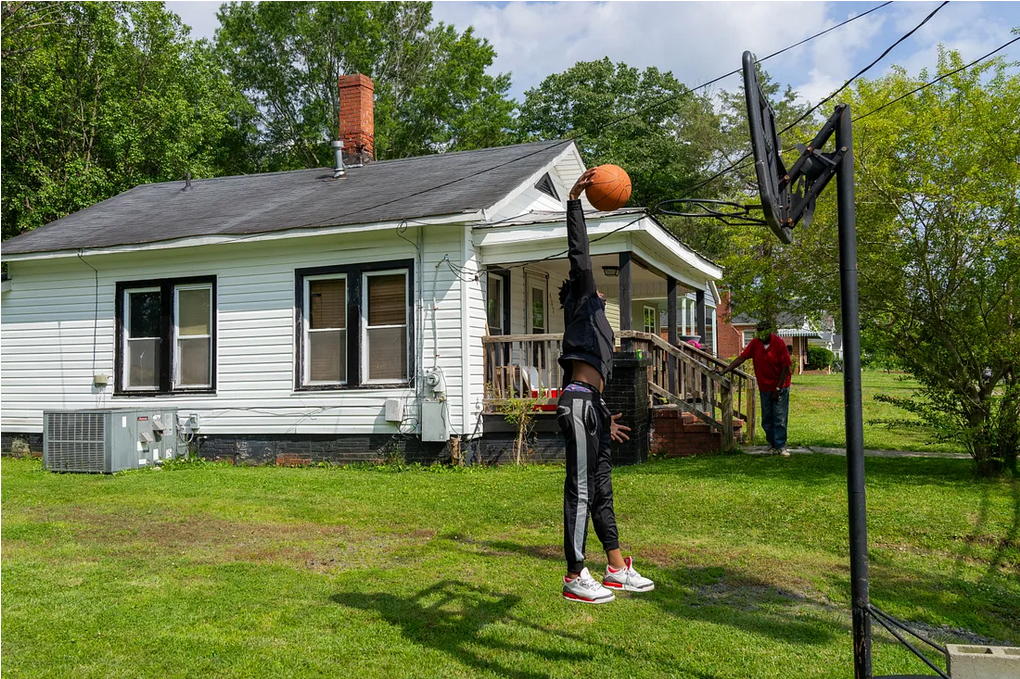By Gwen Frisbie-Fulton
Jason Dunkin lives out in the country on the same small plot of land he grew up on. When I met him at his house recently, the rain was beating down hard on the metal roof. He looked out the window toward the road.
“I remember my dad and my uncles would pick me up from right here,” he said, gesturing to the house around him, “to go play ball.” He smiled at the memory.
They’d go about 15 minutes up the road into Oxford, a small city of just under 9,000 people, to the Granville Street Park.
“Everyone would gather there,” Dunkin said.“Teenagers who came to play ball would bring their younger siblings, so the park was just full all the time.”
The small park —just a basketball court, a small playground, and a field — was one of those places that shape not only childhood memories but a sense of what it is like to grow up in a place. Sitting a block off MLK Ave, it was the center of activity in the mostly Black neighborhood, a place to have a child’s birthday party or grill out with neighbors.
But today the park is empty. The basketball hoops are gone and the blacktop is severely cracked. The heavy rain has made the ground muddy and water pools up over the sidewalks.
There’s a small sign, though, stuck in the grass. It’s a little crooked, beat down by the rain. It reads “Park Renovations Coming Spring 2024.”

Yes, this is a story about a park. But it’s also a lesson for all of us across North Carolina: When people and communities work together, we can organize and bring real change to our towns and counties.
Oxford’s story is similar to many across our state. In the 1990s, the city began to cut back on city services. Politicians reduced taxes on the wealthy while leaving local budgets unfunded — including the budget for the park.
As municipal budgets decreased, people in Oxford struggled to make sense of the town’s neglect of the park. One narrative, spread by the town’s white politicians and others, was that the Granville Street Park was dangerous.
“It’s just urban legend,” said Chelsea Smith, who grew up in the area.
The park fell into disrepair. The beloved basketball hoops were removed; weeds grew up through the pavement.

In the spring of 2023, the local members of Down Home North Carolina, where I work, discovered that millions of Oxford’s American Rescue Plan (ARPA) funding had been left unspent. Additionally, the Oxford City budget had money left over in its budget over several years.
“The lack of investment wasn’t just in a park, it was a refusal to invest in us, the people,” Dunkin told me.
They centered their sights on the city budget-making process. By knocking on doors and circulating a petition about making the park a budget priority, they asked people not only to sign the petition but also to join them in the fight.
All summer they kept it up, and in September, they won the funding. The park gave people a taste of what’s possible with organizing. “We saw what we could do through organizing when we didn’t have any real strong connections in local government,” said Dunkin. “Imagine what we could do if we have our folks in office?”
Soon after the park funding was secured, Down Home members endorsed three local candidates in last fall’s municipal elections, all well-known local guys, which matters.
The members did what they had done with the park: They canvassed, they knocked on doors. These efforts also paid off: Curtis McRae was elected to the Commission, while Guillermo Nurse became Oxford’s first Black mayor.

What the residents of Oxford, North Carolina did last year is nothing short of building their own political power. They held their local elected officials responsible to their needs and then they began to build power that represents them.
In other words, they organized and then they voted. That’s what we all need to do in 2024 and beyond.
If you go to Oxford today after reading this, you will see that construction at the park has started. Springtime is just around the corner; you can almost hear friends chatting, kids laughing — and a basketball being dribbled down the court. Let’s manifest that, statewide.